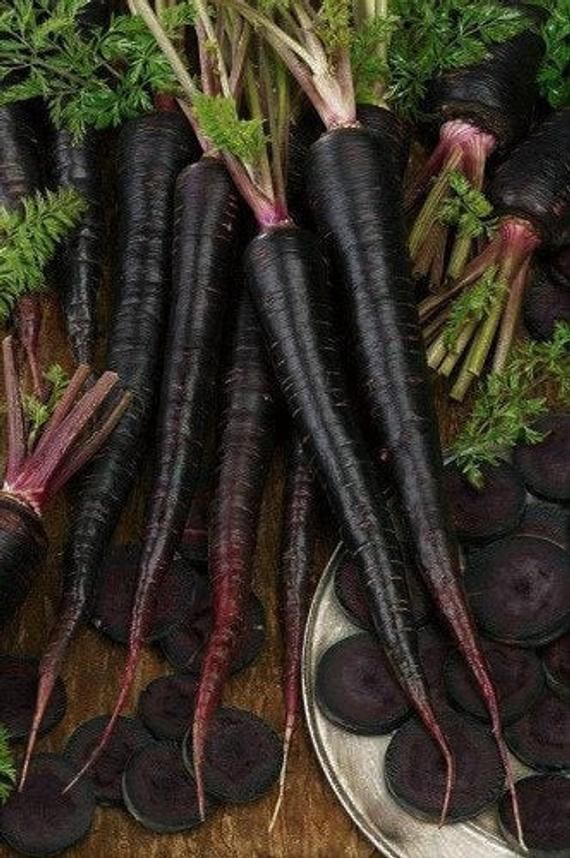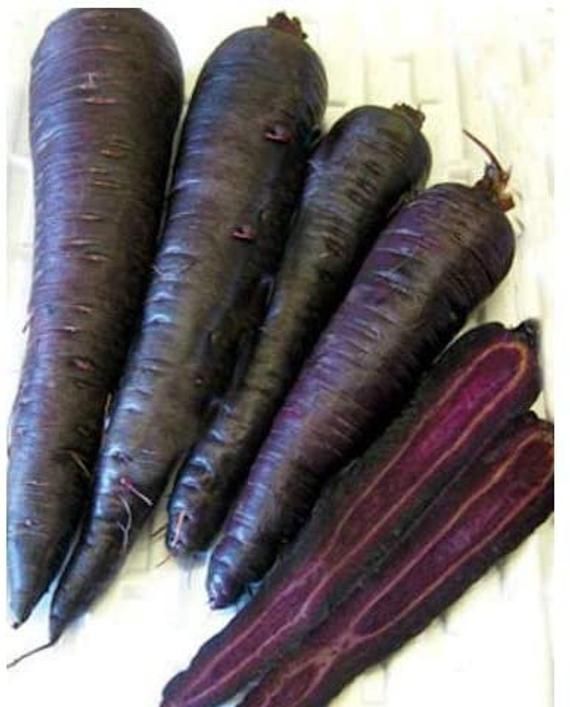What is a Black Carrot?
Have you ever heard of a black carrot? It sounds like something out of a fairytale, but it’s a real vegetable that has been around for thousands of years. Black carrots are a unique variety of root vegetable that are known for their striking dark color and numerous health benefits.
The Exotic Origins of Black Carrots
Unlike traditional orange carrots, black carrots have a rich history that dates back to ancient times. These root vegetables are believed to have originated in present-day Afghanistan and were used extensively in Ayurvedic and Chinese medicine for their numerous health benefits.
It wasn’t until the 16th century that black carrots were introduced to Europe, where they quickly gained popularity. In fact, they were frequently used as a natural dye due to their intense pigment and were even used to color uniforms during World War I.
The Significance of Black Carrots as a Unique Root Vegetable
What sets black carrots apart from their orange counterparts is their high concentration of anthocyanins, which are powerful antioxidants that give them their distinctive color. This antioxidant property also lends itself to several potential health benefits, such as reducing inflammation and supporting heart health.
Black carrots are also an excellent source of essential vitamins and minerals, including vitamin A, potassium, and fiber. This makes them a great addition to any diet and a perfect way to add variety to your meals.
Nutritional Benefits of Black Carrots
Black carrots may not be as well-known as their orange counterparts, but they offer a host of nutritional benefits that make them worth adding to your diet. These dark-colored vegetables are packed with antioxidants and essential nutrients that can help improve your overall health and well-being.
The Nutritional Value of Black Carrots
Black carrots are an excellent source of nutrients like vitamin A, vitamin C, and potassium. They also contain significant amounts of dietary fiber, as well as smaller amounts of iron, calcium, and magnesium. What makes black carrots truly unique, though, is their high concentration of anthocyanins, a type of antioxidant that gives them their dark color.
Antioxidant Properties of Black Carrots
The anthocyanins found in black carrots may help reduce inflammation, protect against oxidative stress, and boost the immune system. These antioxidants have also been linked to improved eye health, reduced risk of chronic diseases, and even better cognitive function. In fact, studies have shown that the anthocyanins in black carrots may be more potent than those found in blueberries or raspberries.
Other Potential Health Benefits
The unique nutritional profile of black carrots means that they may offer a range of health benefits beyond their antioxidant properties. For example, the fiber in black carrots may help regulate digestion and promote feelings of fullness, making them a great choice for weight management. Some research also suggests that black carrots may have antimicrobial properties, making them effective against certain types of bacteria and fungi.
If you’re looking to add more nutrients and antioxidants to your diet, black carrots are an excellent choice. Whether you enjoy them raw, cooked, or blended into a smoothie, these dark-colored vegetables offer a range of unique and impressive health benefits.
Culinary Applications of Black Carrots
Black carrots are a versatile ingredient that can be used in a variety of dishes to add both flavor and color. Here are some recipe ideas to get you started:
Black Carrot Hummus
Ingredients:
- 1 can of chickpeas (drained and rinsed)
- 2 black carrots (peeled and grated)
- 2 cloves of garlic
- 2 tablespoons of tahini
- 1/4 cup of olive oil
- 1/2 teaspoon of salt
- 1/4 teaspoon of cumin
- 1/4 teaspoon of paprika
Directions:
- Combine all ingredients in a food processor and blend until smooth.
- Adjust seasoning to taste.
- Serve with pita bread or vegetables.
Roasted Black Carrots
Ingredients:
- 4-5 black carrots (peeled and cut into equal-sized pieces)
- 1 tablespoon of olive oil
- 1 teaspoon of salt
- 1/2 teaspoon of black pepper
- 1/2 teaspoon of paprika
Directions:
- Preheat oven to 400°F (200°C).
- Toss the black carrots with olive oil, salt, pepper, and paprika.
- Spread the black carrots in a single layer on a baking sheet.
- Bake for 20-25 minutes or until tender and caramelized.
- Serve as a side dish or add to salads or grain bowls.
These are just a few examples of how you can incorporate black carrots into your cooking. Experiment with different combinations and let the unique flavor and color of black carrots add a new dimension to your dishes.
Growing Tips for Black Carrots
Black carrots are a unique and versatile root vegetable that can be used in a variety of dishes. If you’re interested in growing your own black carrots, there are a few things to keep in mind to ensure a successful harvest.
Soil Requirements
Black carrots prefer well-drained soil that is rich in organic matter. The soil pH should be between 6.0 and 7.0. If your soil is too acidic, add lime to raise the pH.
Planting Techniques
Black carrots can be planted in the spring or fall, and they prefer cool weather. To plant black carrots, first, prepare the soil by loosening it to a depth of 8 to 10 inches. Plant the seeds 1/4 to 1/2 inch deep and 1 to 2 inches apart. Water the seeds well after planting.
Maintenance Tips
Once your black carrots have sprouted, it’s important to keep the soil moist but not waterlogged. You can water them deeply once a week, or more frequently if the weather is hot and dry. Black carrots can be harvested when they reach about 6 inches in length. To keep them fresh, store them in a cool, dry place.
By following these growing tips, you can enjoy a bountiful harvest of delicious and nutritious black carrots!
Black Carrots as Natural Dye
Did you know that black carrots make an excellent natural dye? In addition to their culinary and nutritional uses, black carrots can be used to add vibrant and eco-friendly colors to textiles and other materials.
The pigment responsible for the black color in these carrots is called anthocyanin. When extracted and used as dye, it creates shades of purple, blue, and even pink depending on the pH level of the dye bath.
Black carrot dye has been used for centuries in various cultures around the world. In Japan, it was traditionally used to dye samurai robes, while in India it was used to dye silk and wool.
Using black carrot as a natural dye is not only environmentally friendly, but it also has therapeutic benefits. The anthocyanins in black carrots are known for their antioxidant properties, which can help protect skin cells from damage caused by free radicals.
So next time you’re looking for a natural and sustainable alternative to synthetic dyes, consider giving black carrots a try!

Anthocyanins in Black Carrots
Black carrots are not only unique in their appearance but also in their nutritional properties. One of the health-promoting components found in black carrots is anthocyanins, which are powerful antioxidants that give them their distinctive color.
Anthocyanins are a type of flavonoid, which are compounds that are widely distributed in plants and have been associated with various health benefits. In black carrots, anthocyanins are present in high amounts, and research has shown that they have potent antioxidant and anti-inflammatory effects.
Antioxidants are substances that can protect cells from damage caused by free radicals, which are unstable molecules that can harm cells and contribute to the development of chronic diseases such as cancer, heart disease, and Alzheimer’s. Studies have shown that anthocyanins in black carrots can help to scavenge free radicals and protect cells from oxidative stress.
In addition to their antioxidant properties, anthocyanins in black carrots have been linked to potential health benefits such as improved cardiovascular health, reduced risk of cancer, and enhanced cognitive function. These benefits are thought to be due to the anti-inflammatory and vasoprotective effects of anthocyanins, which can help to improve blood flow and reduce inflammation in the body.
Conclusion
Black carrots are a unique and nutritious root vegetable that provides a range of health-promoting properties, including high levels of anthocyanins. These powerful antioxidants can help to protect cells from damage, reduce inflammation, and improve cardiovascular and cognitive function. Incorporating black carrots into your diet is a delicious and healthy way to reap the benefits of this superfood.
Conclusion
Black carrots might not be the most common vegetable, but they are certainly worth exploring. With their exotic origins and unique nutritional properties, they make a bold addition to your diet. Not only are they delicious and versatile in the kitchen, but they also have potential health benefits.
So, what have we learned about black carrots?
Firstly, we discovered that black carrots are a root vegetable with a long and fascinating history, originating in the Middle East thousands of years ago. Secondly, we explored the nutritional benefits of these dark, mysterious veggies, such as their impressive antioxidant content and potential immune and eye health benefits.
We also learned that black carrots have many culinary applications, making them a great ingredient in a range of dishes. Additionally, we picked up some useful tips for growing black carrots successfully in your own garden.
Lastly, we discovered the unique use of black carrots in natural dyeing, adding a splash of color to textiles and materials.
Black carrots may not be widely known, but they certainly have a lot to offer. So next time you come across a black carrot, don’t hesitate to give it a try!

FAQ
Q: What is a black carrot?
A: A black carrot is a unique variety of carrot that has a dark purple or almost black color. It is a natural mutation of the traditional orange carrot and is known for its rich anthocyanin content.
Q: Where do black carrots come from?
A: Black carrots have been cultivated for centuries in parts of Asia and the Middle East. They are believed to have originated in Afghanistan and were later introduced to Europe and other parts of the world.
Q: Are black carrots good for you?
A: Yes, black carrots are packed with nutrients and antioxidants. They are a good source of fiber, vitamin C, and various minerals. The anthocyanins present in black carrots have been linked to numerous health benefits.
Q: How can black carrots be used in cooking?
A: Black carrots can be used in a variety of culinary applications. They can be grated or sliced and added to salads, soups, stir-fries, or roasted alongside other vegetables. They can also be juiced or used to create vibrant natural dyes for food or textiles.
Q: Can I grow black carrots in my garden?
A: Yes, black carrots can be grown in home gardens. They require well-drained soil and full sun. Sow the seeds directly into the ground in early spring and keep the soil moist throughout the growing season. Harvest the carrots when they reach the desired size.
Q: Are black carrots only used for food?
A: No, black carrots have been traditionally used as a natural dye. The deep purple color from the black carrots can be extracted and used to dye fabrics, yarns, and other materials. It provides a unique and eco-friendly alternative to synthetic dyes.
Q: What are anthocyanins and why are they important?
A: Anthocyanins are natural pigments found in black carrots and other purple and red fruits and vegetables. They are powerful antioxidants that help protect cells from damage caused by harmful free radicals. Consuming foods rich in anthocyanins has been associated with various health benefits.




